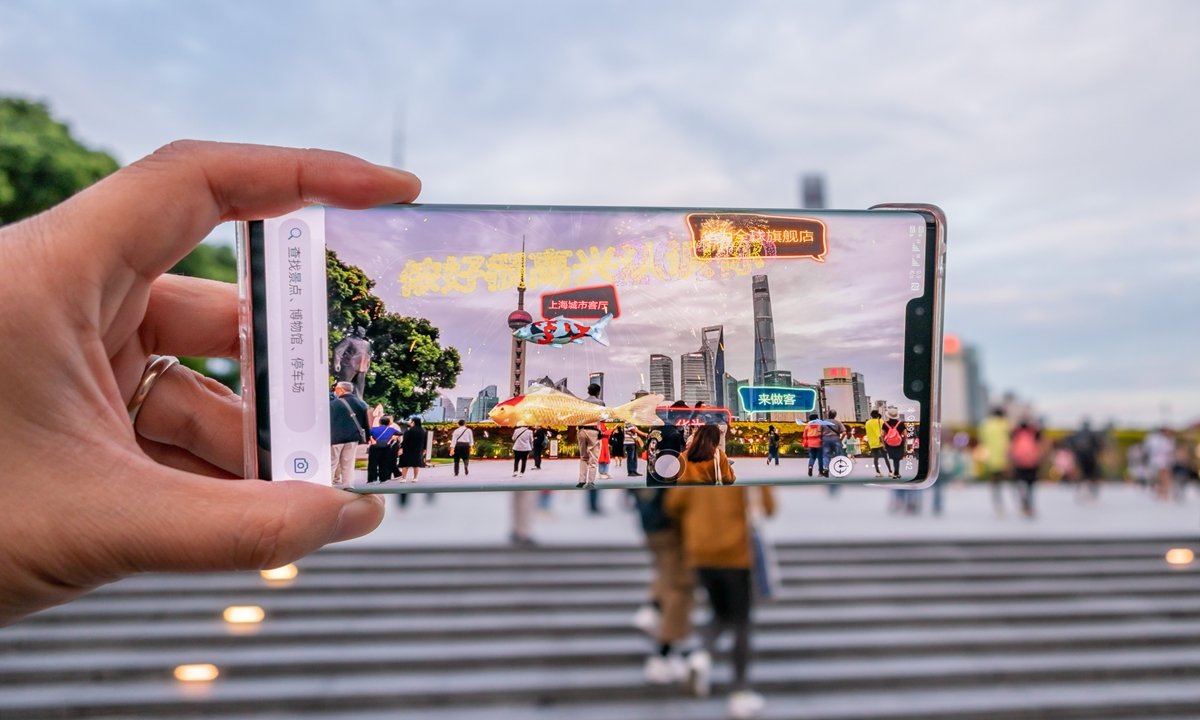Huawei faces tough competition in home devices market
By Zhang Dan Source: Global Times Published: 2020/10/12 19:38:40

A Shanghai resident goes sightseeing using the augmented reality map function of a Huawei smartphone. The function acts like an intelligent tour guide by identifying sites along the road. Photo: cnsphoto
Huawei may face intense competition in the domestic devices market against rivals including Xiaomi, OPPO and Vivo, as well as US brand Apple, if the US semiconductors supply ban on the company stays in place, industry observers say.
Amid the China-US technology battle, Huawei decided to release the much-anticipated Mate 40 on October 22, about one week after the launch of the iPhone12 series on Wednesday.
The competition between the two smartphone brands in China's market centers on the high-end segment, which is a small part of China's smartphone sales, according to industry observers.
"For years, Apple has played 'defense' and Huawei has played 'offense' in China's high-end smartphone market. It will be the same this year," Fu Liang, a Beijing-based telecom industry expert, told the Global Times on Monday.
Huawei owns mature 5G technology and a smartphone market share of nearly 50 percent in China. But things have changed now.
"If the US government microchips ban is implemented strictly, Huawei's smartphone sales may plunge soon due to a lack of key parts," Fu said, adding the company's market share in China may drop.
After being hit by the US government which is lobbying its allies to stop using Huawei's telecom equipment, too, Huawei has shifted part of its financial and material resources to secure its market share at home, industry analysts say.
To date, Huawei has not only survived, it has also thrived.
According to market research firm International Data Corp (IDC), Huawei accounted for 45.2 percent of China's smartphone market in the second quarter this year, increasing 9.5 percentage points year-on-year. Chinese smartphone makers Vivo, OPPO and Xiaomi followed, holding 17.1 percent, 16 percent and 10.4 percent of the market respectively. Apple took 8.3 percent.
Since the US chip ban on Huawei only took effect on September 15, it is too early to tell the fate of Huawei's smartphone business.
If Huawei's chip supplies still encounter difficulties in the second half of next year, that will be alarming for Huawei as other Chinese smartphone makers are standing by with a variety of 5G devices and eyeing the lower-end smartphone segment, Lin Meibing, an industry analyst, told the Global Times.
According to the Hurun China Top 10 most valuable consumer electronics companies list, released on Monday, Huawei had a value of 1.1 trillion yuan ($160 billion). Xiaomi ranked second with 434 billion yuan, and Vivo was third with 175 billion yuan, surpassing OPPO for the first time.